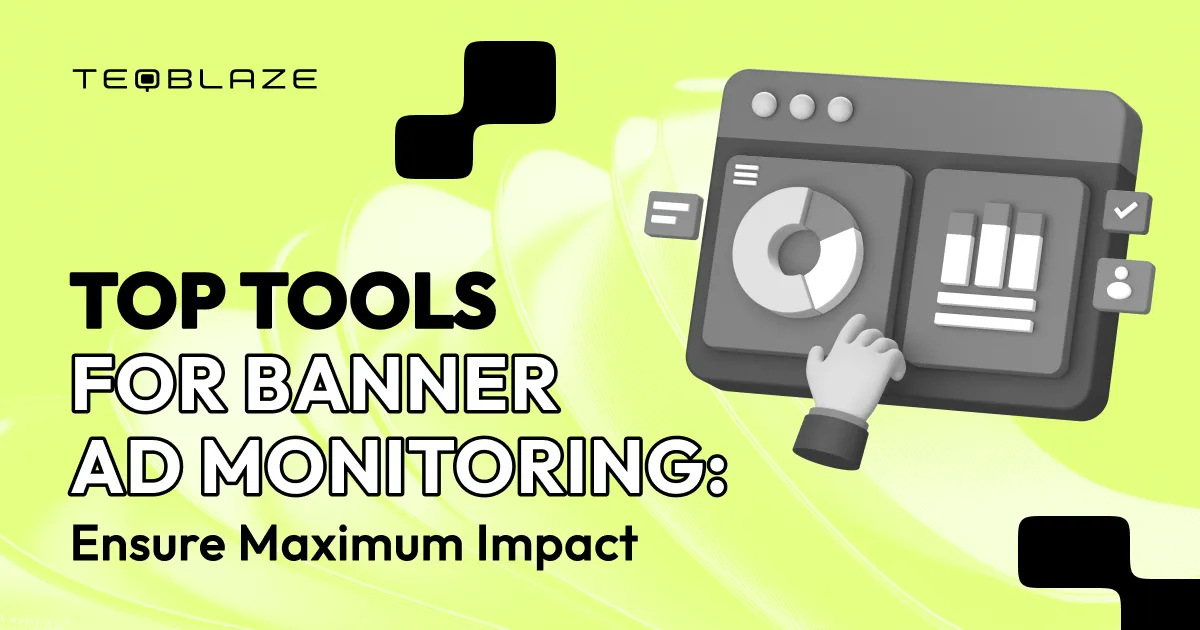The modern landscape of digital marketing involves many practices and strategies aimed at helping brands boost the demand for their products and services. In this article, we will explore adtech and martech, essential technologies for promoting brand awareness and customer loyalty. Understanding the difference between the two approaches is crucial if you want to maximize ROI. These two concepts often overlap, but they serve different purposes and have some critical differences.
What are these differences? And what benefits can adtech and martech bring to your business? Keep reading for a better understanding of the two concepts and their value. Here you will find the definitions for adtech and martech, core technologies applied for implementing both approaches, their key differences and benefits, as well as tips on combining adtech and martech together.
What is MarTech?
Martech is a rather broad notion. It encompasses various solutions that facilitate the planning and the execution of marketing campaigns. These tools help companies streamline many crucial workflows, such as customer relationship management, email marketing, data analytics, etc.. By relying on martech, companies can streamline operations, personalize customer experiences, and ensure data-driven decision-making. Contrary to adtech, which focuses on acquiring new customers, martech is more focused on retaining existing ones.
Key technologies for MarTech tools
Many companies invest solid parts of their marketing budgets into martech technologies. Those are the tools that empower teams to guide prospects through the marketing funnel and establish more consistent customer relationships. The list of popular martech tools is pretty solid. It primarily involves the categories enumerated below.
Web analytics platforms
Analytical tools help companies retrieve and process insights on the performance of their platforms and user behaviors. With such solutions, companies can track traffic sources, user engagement, and conversions, optimizing digital strategies. Notable examples of such tools are Google Analytics and Adobe Analytics.
Social media management tools
Centralized platforms allow marketers to schedule, publish, and monitor content across multiple social networks. They simplify engagement, performance tracking, and audience interaction. Some notable examples of such tools include Hootsuite and Buffer.
Customer relationship management (CRM) platforms
CRMs can organize and manage customers and lead information in one place. Those are the systems capable of tracking interactions, supporting personalized outreach, and offering behavioral insights. The list of such solutions includes some notable names, including Salesforce and HubSpot.
Solutions for search engine optimization (SEO)
The domain of martech also involves SEO tools that assist companies in optimizing their web platforms' SEO scores. Here it goes about tools that help marketing and SEO specialists find the right keywords and keyword opportunities. Such solutions assist businesses in content optimization, link building, and SEO performance monitoring. This enables companies to enhance organic visibility and improve search rankings. There is a great range of SEO martech tools with Ahrefs and SEMruch often listed among the most popular ones.
Marketing automation systems
Many businesses apply martech solutions that help them streamline repetitive tasks and deliver targeted messages across multiple channels. Marketing automation tools can cover a range of platforms and channels, including email, web, and SMS. With such applications, marketologist can save time significantly. Some notable examples of marketing automation solutions are Pardot and Act-On.
Content management systems (CMS)
Finally, there is a great demand for CMS platforms. Those are martech solutions that help businesses create, manage, and update web content without involving much technical skills. Many popular websites are based on such systems enhanced with particular plugins for better customization. For example, WordPress, the most popular CMS systems, powering around 43% of all websites globally.
What is AdTech?
The notion of adtech refers to the collection of tools that are applied for planning, delivering, managing, and measuring digital advertising campaigns. Such technologies support a wide array of processes, ranging from programmatic ad buying to audience targeting. With adtech, marketers can reach new users via different platforms. A very important factor in the context of the martech vs. adtech comparison is that adtech is primarily used to attract new customers instead of nurturing the existing ones.
Key technologies for AdTech tools
Now, let's discuss technologies that are typically applied in the adtech domain. These are the core innovations that serve as the pillars of the modern advertising industry.
Demand-side platforms (DSPs)
Purchasing diverse ad spaces is one of the cornerstones of digital advertising. With DSP, companies can bid for open ad slots on a per-impression basis. Notable examples of DSPs include The Trade Desk and AppNexus.
Supply-side platforms (SSPs)
SSPs are the primary technologies applied by ad publishers. These are the platforms used for selling the open ad space inventory. With SSP solutions, publishers cna automatically list spaces on multiple exchange platforms. As an example of a successful SSP, we can mention PubMatic.
Ad exchange platforms
Many businesses use ad exchanges to find places to buy or sell advertising space. Basically, ad exchanges serve as marketplaces for DSPs and SSPs. They take the form of real-time auctions that allow companies to quickly buy and sell ad space. Important examples of ad exchange platforms are AdX and Rubicon Project.
SEM (search engine marketing) platforms
With search engines, marketers can find and purchase ad spaces by specific keywords. By applying SEM tools, companies can gain business search exposure, drive awareness, and attract new customers. All these factors are crucial for ads' SEO ranking.
Data management platforms (DMPs)
DMPs help marketers collect, manage, and analyze data for business intelligence. They aid in gathering various types of information from different online and offline sources. Notable examples of DMPs are BlueKain and Adobe Audience Manager. These solutions provide features for storing customer information and demographics. All such data can be later used for more efficient analytics and segmentation.
Programmatic ads
Programmatic advertising allows businesses to save time by implementing programmatic ads to identify audiences based on demographics and find the best time slots for advertising outreach. Programmatic advertising provides opportunities for real-time campaign optimization and tools for advanced analytics that ensure efficient customer segmentation. As examples of notable programmatic advertising platforms, we can mention Google and Media Math.
Differences between AdTech and Martech
We have already analyzed some aspects of the adtech vs. martech comparison. However, this question deserves a closer look. The table below compares the two approaches in order to show the difference between martech and adtech.
MarTech | AdTech | |
Primary Goal | Engage, nurture, and retain existing customers | Attract new customers |
Focus Area | Owned and earned media (email, content, CRM, SEO, etc.) | Paid media (display ads, video ads, search ads, etc.) |
User Journey Stage | Mid to bottom of the funnel (engagement & retention) | Top of the funnel (awareness & acquisition) |
Key Tools | CRM, email marketing, CMS, marketing automation, SEO, analytics | DSPs, SSPs, ad exchanges, DMPs, programmatic platforms, SEM tools |
Data Usage | Primarily first-party data | Combination of first-, second-, and third-party data |
Execution Style | Campaigns are usually planned and scheduled manually | Highly automated and real-time through programmatic buying |
Metrics Tracked | Engagement rate, open rate, conversion rate, customer lifetime value | Impressions, click-through rate (CTR), cost per click (CPC), ROAS |
Benefits of MarTech
Martech brings businesses a range of advantages that help them enhance conversion and marketing performance as the business grows. These are the key benefits of such technologies:
Ability to tailor messages and content based on user behavior and preferences.
Automation features that allow companies to save time by streamlining repetitive tasks like emails and social posts.
Tools for analytics that can be used for improving business ROI.
Enhanced targeting and segmentation that allows companies to reach the right audience with the right message.
Cross-channel integration for consistent messaging across platforms.
Benefits of AdTech
Adtech helps businesses acquire new customers by streamlining advertising campaigns. It also provides a rich set of tools for delivering tailored messages and enhancing user engagement. Some of the critical features of adtech include:
Ability to deliver ads to the right audience based on demographics, behavior, and interests.
Features for adjusting bids, creatives, and placements almost instantly.
A rich set of features for managing programmatic advertising.
Advanced analytics and insights that allow businesses to track critical metrics and conversions in real time.
Cross-channel reach, which means that companies can manage campaigns across web, mobile, social, and video from one platform.
How MarTech and AdTech work together
It is important to mention that martech and adtech can work efficiently while combined together. While martech tools will focus on nurturing existing customers through personalized content and automation, adtech will help a company find new ones through targeted advertising. While combined efficiently, martech and adtech can create a seamless marketing funnel.
A popular practice is integrating user data from martech platforms with adtech systems. This ensures greater precision and consistency in ad targeting and messaging. With such an alignment, advertising efforts are informed by customer insights, which improves relevance, engagement, and ROI. The key point here is to think strategically. The right approach to combining martech and adtech can help businesses achieve greater efficiency in all their marketing efforts.
Consider TeqBlaze your trusted partner
So, even if you are into implementing martech strategies, adtech platforms will come in handy. To develop and implement adtech technologies properly, rely on experts with a proven portfolio of successful projects in the domain. We at Teqblaze are ready to help.
We have a rich portfolio of successful projects, including:
A case where we created an SSP platform that helped Boldwin enhance monetization and platform capabilities
A project where we helped a U.S. marketing company optimize their ad conversion with a customized white-label DSP solution.
TeqBlaze is also ready to help our customers enhance their adtech practices with a special suite of services. And we are ready to handle the development of your custom adtech solution tailored to your needs specifically.

Final word
Adtech and martech both provide powerful tools for enhancing brand reputation and boosting brand ROI. It is important to understand the distinctions between the two concepts to apply both adtech and martech properly. However, it is also vital to understand how they work together. With the right approach to combining martech and adtech, you get an opportunity to craft high-performing marketing strategies. You can reach new audiences and drive brand awareness by using adtech solutions, while martech tools will help you keep your existing customers interested and satisfied. When combined, these two pillars of digital marketing create a powerful, end-to-end ecosystem that spans the entire customer journey.
The key point is to choose the right approach and the most efficient technology solutions that will allow you to integrate adtech and martech properly. We at Teqblaze are ready to provide you with strategic guidance and technical support for an impactful unified approach.
Rely on TeqBlaze as your trusted partner. Whether you are building a custom DSP, launching an SSP platform, or integrating martech tools for better audience engagement, our team brings the experience, innovation, and technical expertise needed to deliver results. Let’s transform your digital strategy together!

 Anna Vintsevska
Anna Vintsevska Karolina Bendryk
Karolina Bendryk





